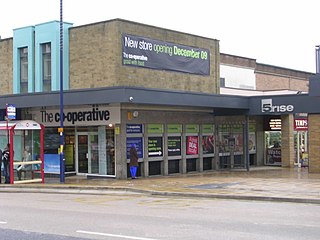
Bingley is a market town and civil parish in the metropolitan borough of the City of Bradford, West Yorkshire, England, on the River Aire and the Leeds and Liverpool Canal, which had a population of 18,294 at the 2011 Census.

Riddlesden is a suburb of Keighley in the county of West Yorkshire, England and on the Leeds and Liverpool Canal.

Wilsden is a village and civil parish in west Bradford, in West Yorkshire, England. Wilsden is 6 miles (9.7 km) west of Bradford and is close to the Aire Valley and the nearby villages of Denholme, Cullingworth, Harden, Cottingley and Allerton. Wilsden re-acquired civil parish status in 2004. The 2001 census revealed a population of 3,697, increasing to 4,807 at the 2011 Census.
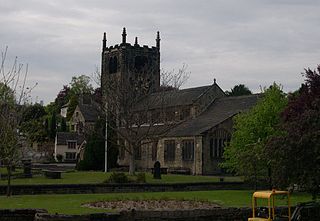
Church of All Saints is the Anglican parish church in the town of Bingley, West Yorkshire, England. It is one of two Anglican churches in the town, the other being Holy Trinity. All Saints has existed since Norman times and it is set in the oldest part of the town, near to where the River Aire is crossed by Ireland Bridge.

East Morton is a small village which lies 2 miles (3 km) north of Bingley and 2.5 miles (4 km) east of Keighley, in the county of West Yorkshire, England. The small hamlet of West Morton lies 1 mile (1.6 km) to the north west. The village has a population of 1,169 according to the 2011 census.
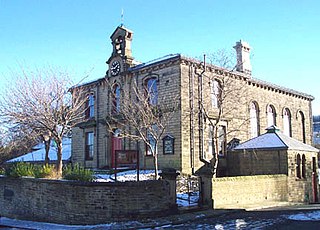
Cottingley is a suburban village within the City of Bradford district in West Yorkshire, England between Shipley and Bingley. It is known for the Cottingley Fairies, which appeared in a series of photographs taken there during the early 20th century.

Leeds Cathedral, formally the Cathedral Church of St Anne, commonly known as Saint Anne's Cathedral, is the cathedral of the Roman Catholic Diocese of Leeds, and is the seat of the Roman Catholic Bishop of Leeds. It is in the city of Leeds, West Yorkshire, United Kingdom. The city of Leeds does not have a Church of England cathedral although it is in the Anglican Diocese of Leeds. The cathedrals of the Anglican diocese are in Ripon, Wakefield and Bradford. The city instead has a Minster which is similar to nearby Dewsbury Minster and Halifax Minster, all of which are parish churches.
Harden is a civil parish and village within the City of Bradford Metropolitan District, West Yorkshire, England, 2 miles (3.2 km) west of Bingley. It had a population of 1,615 in the 2001 census, but by 2011 this had risen to 1,900.

Idle is a residential suburban area in the city of Bradford, West Yorkshire, in England and was a separate village, and before that it was the Manor of Idle. Idle is loosely bordered by the areas of Eccleshill, Wrose, Thackley, Apperley Bridge, and Greengates, in the north-east of the city.
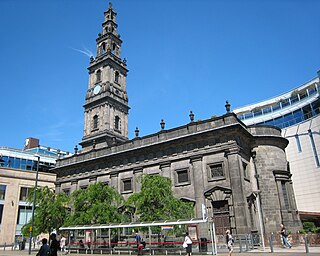
Holy Trinity Church lies on Boar Lane in Leeds, West Yorkshire, England. It is a Grade I listed Church of England parish church in the Parish of Leeds St George in the Diocese of Leeds. It was built in 1722–7, though its steeple dates from 1839. Holy Trinity is in the evangelical church tradition of the Church of England.

Holy Trinity Avonside was a heritage-listed Anglican church located in Linwood, Christchurch, New Zealand. It was registered as a "Historic Place – Category I" by the New Zealand Historic Places Trust. The church building was "damaged beyond the point of repair" in the February 2011 Christchurch earthquake and was demolished the following September.

Holy Trinity Church is in High Street, Skipton, North Yorkshire, England. Medieval in origin, the church is recorded in the National Heritage List for England as a designated Grade I listed building. The older active Anglican parish church in the town, it is located in the deanery of Skipton, the archdeaconry of Craven and the Diocese of Leeds. Its benefice is united with that of a church in a neighbouring village: St Augustine, Draughton.
Paul John Slater is a retired Anglican bishop. From 2018 until January 2022, he was the Bishop of Kirkstall, a suffragan bishop in the Diocese of Leeds. He was Archdeacon of Craven from 2005 to April 2014, Archdeacon of Richmond and Craven from April 2014 to July 2015, and Bishop of Richmond from 2015 until his title changed in 2018.

The Holy Trinity Church in Rothwell, West Yorkshire, England is an active Anglican parish church in the archdeaconry of Leeds and the Diocese of Leeds.

All Hallows Church in Bardsey, West Yorkshire, England is an active Anglican parish church in the archdeaconry of Leeds and the Diocese of Leeds.
Beverley Anne Mason is a British Anglican bishop. Since 2018, she has served as the Bishop of Warrington, a suffragan bishop in the Diocese of Liverpool. She was the Archdeacon of Richmond and Craven in the Diocese of Leeds from 2016 to 2018.
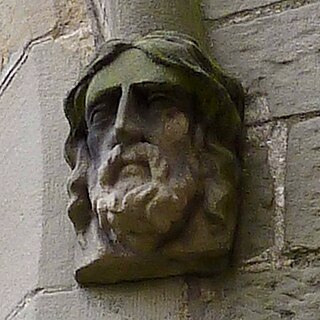
William Ingle was an architectural sculptor in Leeds, West Yorkshire, England. He specialised in delicately undercut bas relief and small stand-alone stone sculptures of natural and imaginary flora and fauna on churches and on civic, commercial and domestic buildings. He was apprenticed to his uncle Robert Mawer. After Mawer's death in 1854 he worked in partnership with his aunt Catherine Mawer and his cousin Charles Mawer in the company Mawer and Ingle. Notable works by Ingle exist on Leeds Town Hall, Endcliffe Hall, Sheffield and Moorlands House, Leeds. He sometimes exhibited gentle humour in his ecclesiastical work, such as faces peering through greenery, and mischievous humour on secular buildings, such as comic rabbits and frogs among foliage. He died of tuberculosis at age 41 years, having suffered the disease for two years.
Alfred Hill Thompson, ARIBA was an English architect in the Gothic Revival and Arts and Crafts styles, who specialised in small schools and chapels in the Yorkshire area. In partnership with Isaac Thomas Shutt he co-designed the Church of All Saints, Harlow Hill, completed in 1871.

Hainworth is a hamlet 1 mile (2 km) south of Keighley in West Yorkshire, England. The hamlet faces north across the lower end of the Worth Valley with a steep wooded incline towards Keighley.

The Church of St Alkelda, Giggleswick, is an Anglican church in the village of Giggleswick, North Yorkshire, England. St Alkelda's was the mother church for the extended parish of Giggleswick, until the church in Settle was built in 1838, and later became a separate parish.

















